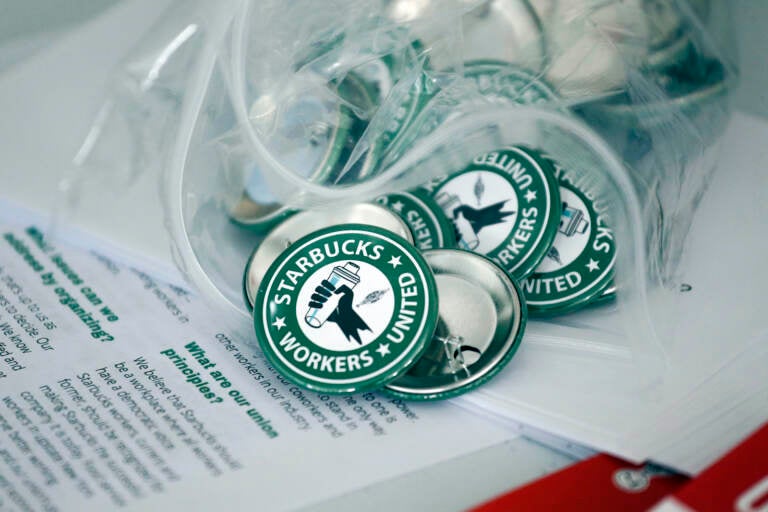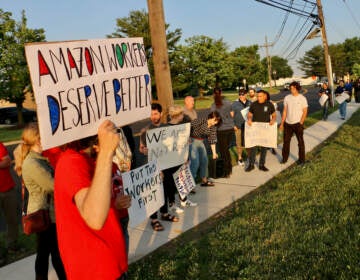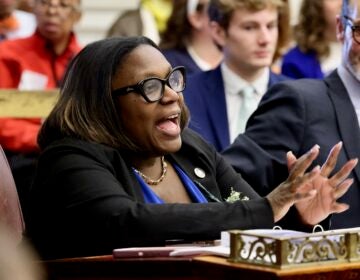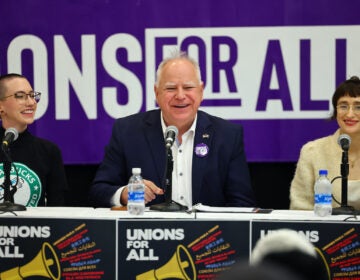Labor solidarity ‘brewing’ in Philly as workers organize for better wages, benefits
Five Philly Starbucks have voted to form unions in a town with a long history of labor organizing. It’s happening for a reason, write Paul Prescod and Daisy Confoy.

Pro-union pins sit on display, Dec. 9, 2021. (AP Photo/Joshua Bessex, File)
Five Starbucks stores in Philadelphia have voted to form unions, helping reach over 100 unionized stores nationwide. Workers say they want consistent schedules and higher wages from a company generating billions of dollars each year. Amazon workers in Bellmawr, New Jersey walked off the job, citing broken promises following the company’s decision to close a facility and relocate up to 90% of workers to faraway facilities on short notice.
Workers at these mega-corporations aren’t the only ones standing up for themselves.
At Korshak Bagels, Good Karma Cafe, and the Canopy by Hilton, Philadelphia workers have also formed unions in recent months. The unions at each demand a say in COVID-19 safety policies, wages, and benefits. Across the city, workers in industries that until recently seemed nearly impossible to organize are showing that there’s nowhere they can’t win.
For those familiar with Philadelphia’s rich history of labor militancy, recent activism from baristas and warehouse workers may not be a surprise. In the early years of the republic, Philadelphia was the beating heart of the American labor movement.
In 1794, shoemakers formed the first trade union in the country. In 1835, nearly 20,000 workers united for the country’s first general strike, winning a 10-hour workday. During the height of labor’s power in the 1930s, “Philly was known as a place where labor warfare was real.” Philadelphia sanitation workers engaged in a strike known as the “garbage riots,” winning their first contract shortly thereafter.
But a lot has changed since labor’s heyday. For many reasons, union membership has declined to 10.3% of the overall workforce. One critical turning point occurred in the early 1980s, when Ronald Reagan fired more than 11,000 striking air traffic controllers and banned them from being rehired. Democrats, from Bill Clinton to Barack Obama, share plenty of blame too. Both former presidents pushed to privatize our public school system and expanded so-called “free trade agreements.” Most notorious is NAFTA, which gave companies a big advantage when facing off against their workers — the credible threat of relocation to Mexico.
Philadelphia’s workers and their supporters aim to reverse this decline. In addition to cafes and warehouses, nonprofit and public sector workers have seen sharp increases in organizing activity. From reproductive health to workers’ rights to public defense, new unions are sprouting up across the city.
Already established unions, too, are fighting with renewed vigor. The Philadelphia Federation of Teachers won a hard-fought contract in September, securing raises for teachers and staff. After working through the early pandemic without hazard pay and PPE, AFSCME DC 33 elected Ernest Garrett as its first new president since 1996. Workers represented by AFSCME DC 47 on Friday voted to establish a strike fund after two years of foot-dragging from Philadelphia Museum of Art management. And both AFSCME locals are fighting to fully fund our libraries and recreation centers, which are operating at “crisis” staffing levels.
Revitalized labor is flexing its electoral muscles too. Last month, Democrats voted overwhelmingly against party-backed challengers, choosing instead to support progressive incumbents Rick Krajewski and Elizabeth Fiedler. And more than 12,000 people voted for an insurgent state Senate candidate (who is also one of the co-authors of this article), Paul Prescod. All three ran as proud socialists and secured support from key labor unions.
Beyond workers, community organizations enthusiastically support the renewed energy for workplace democracy. Our organization, the Philadelphia Democratic Socialists of America (DSA), has been talking to customers outside Starbucks stores for months to draw attention to management’s union-busting, forging relationships with workers and engaging community members in the struggle.
We are now 22 months without a contract @philamuseum. Negotiations continue but slowly. Wages remain significantly below peers, healthcare is still unaffordable.
— Philadelphia Museum of Art Union (@PMA_Union) June 3, 2022
At a meeting of our Local last week, 98% voted to establish a STRIKE FUND. It launches today:https://t.co/P7OZO2HHtu
DSA argues that building a fighting labor movement strengthens the working class as a whole, and that everyone deserves democratic control over their workplaces. That’s why DSA’s Emergency Workplace Organizing Committee provides training, guidance, and media support to workers in Philadelphia and nationwide who are organizing at their jobs.
If the uptick in unionizing cafes, warehouses, nonprofits, schools, and more industries than we can list is any indication of where labor is headed, it seems Philadelphia is returning to its union roots.
___
Paul Prescod is a member of the labor branch of the Philadelphia Democratic Socialists of America and a former candidate for the Pennsylvania state Senate.
Daisy Confoy is the communications chair of the Philadelphia Democratic Socialists of America.
WHYY is your source for fact-based, in-depth journalism and information. As a nonprofit organization, we rely on financial support from readers like you. Please give today.






